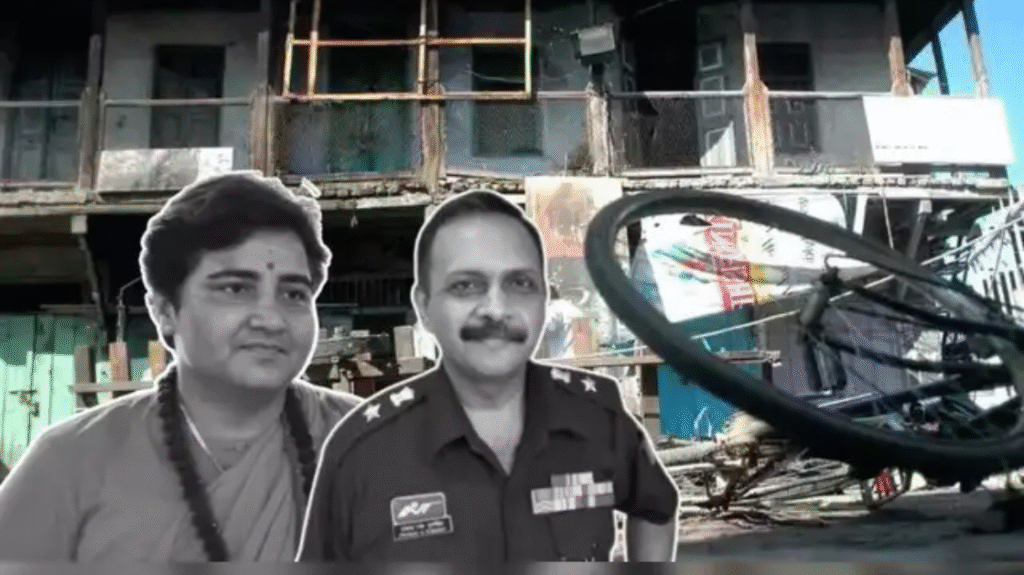In a landmark judgment, a Special National Investigation Agency (NIA) Court in Mumbai today acquitted all seven accused, including former BJP MP Sadhvi Pragya Singh Thakur and retired Lt Col Prasad Purohit, in connection with the 2008 Malegaon bomb blast. The court cited absence of “cogent and reliable” evidence, procedural lapses under UAPA, and flawed sanction orders, marking a dramatic conclusion to a nearly two-decade-long legal saga.
🚨 The 2008 Incident Recalled
On September 29, 2008, a motorcycle-borne bomb exploded near a mosque in Malegaon, Maharashtra, killing six individuals and injuring over a hundred. Originally investigated by Maharashtra ATS and later the NIA, the blast became a flashpoint for debate over so-called “Hindu terror.” The accused faced charges under the Unlawful Activities (Prevention) Act (UAPA) and multiple IPC sections including murder and criminal conspiracy.
🧾 Why Acquittal Was Granted
Special Judge A. K. Lahoti, in a detailed judgment exceeding 1,000 pages, acknowledged there might be strong suspicion against the accused, but noted that suspicion alone cannot sustain a conviction. Critical forensic links and sanction orders were missing or defective, and the prosecution failed to meet the standard of proof beyond reasonable doubt.
🗣️ Reactions Across the Spectrum
- Sadhvi Pragya’s Response: She hailed the verdict as a victory for “Bhagwa” and Hindutva, stating that the investigation destroyed her life and calling for divine punishment for those who defamed her.
- Family Statement: Her sister Upma Singh declared “truth won” and spoke of intense suffering endured by the family. Their father died during the prolonged legal ordeal.
- Political Responses: BJP leaders such as Uma Bharti, Shaina NC, and Ravi Shankar Prasad criticized the Congress for coining a “Hindu terror” narrative and demanded apologies for alleged political misuse of investigations.
- Opposition View: Congress MP Digvijay Singh emphasized that terrorism has no religion, calling the verdict proof of impartial justice. Former Maharashtra CM Prithviraj Chavan accused the NIA of failing to provide evidence and hinted at political interference given its reporting structure.
⚖️ Legal & Institutional Implications
Failure of Sanction Orders: The court noted invalid sanction provisions under the UAPA, which are mandatory for terror accusations. This procedural gap undermined the prosecution’s case.
Credibility of Investigative Agencies: The case raises critical questions about ATS and NIA methodologies, particularly accusations of framing and evidence planting in earlier probes—claims partially corroborated by ex-prosecutor Rohini Salian’s statements, alleging pressure to go soft on certain defendants.
Impact on Radical Terror Narratives: Labels like “Hindu terror” are now under renewed scrutiny. The acquittal has energized criticism regarding politicization of investigations, with judicial authorities calling out narrative-driven prosecutions.
🧩 Broader Significance & Next Legal Steps
The acquittal not only restores the legal standing of all seven accused but also shines a spotlight on prosecutorial accountability and the legal thresholds under anti-terror statutes. Victims’ legal counsel have announced intentions to appeal in the High Court, ensuring the matter remains active in judicial review.
✅ Summary Table
| Issue | Court Finding / Implication |
|---|---|
| Lack of Evidence | Insufficient proof to convict |
| Procedural Errors | UAPA sanction orders invalid |
| Political Controversy | “Hindu terror” narrative questioned |
| Victim Families’ Appeal | Legal appeal anticipated in High Court |
| Investigative Integrity | Calls for systemic reforms in terror probe mechanisms |
🧠 Final Word
The Malegaon blast case verdict ends one of India’s most divisive terror trials, underscoring the principle that justice cannot rest on suspicions. It also serves as a reminder that judicial scrutiny and forensic rigor are essential—especially in cases intertwined with political and religious narratives. As the legal journey enters new phases, both legal experts and activists will closely monitor the balance between national security and justice under law.
To read more Indian Laws and news, visit Legal Guide India



